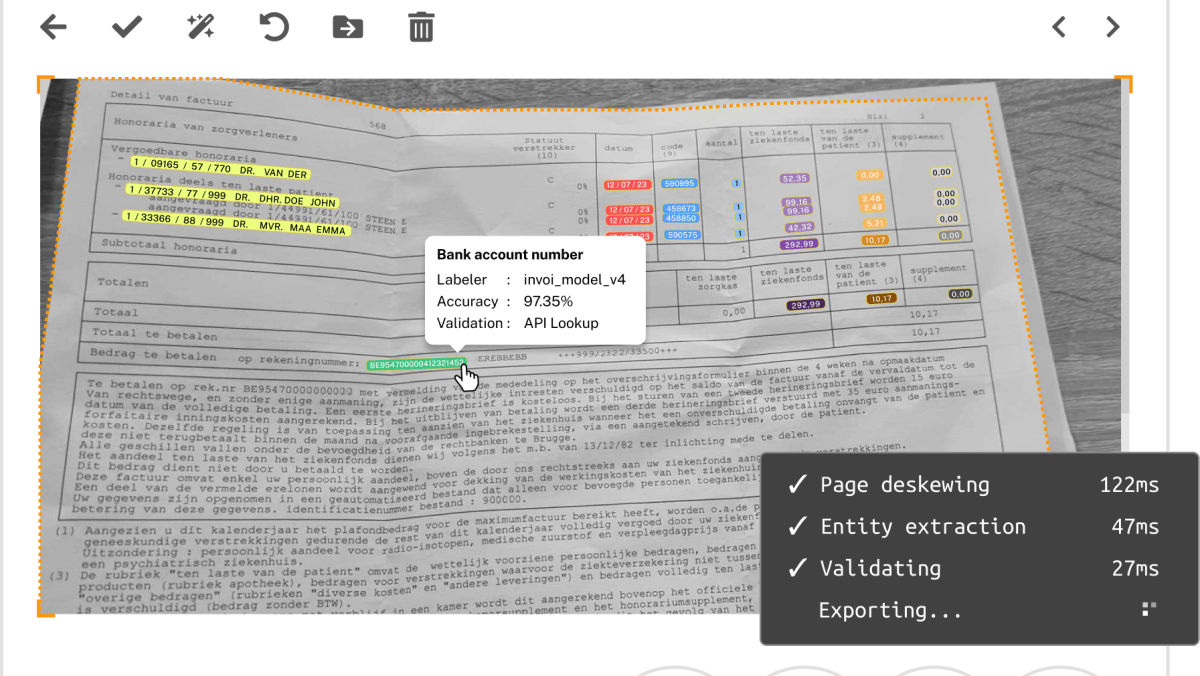A new and innovative startup based in the Netherlands is poised to revolutionize the document processing world. Send AI, backed by Google’s Gradient Ventures, offers a customizable platform that helps companies extract data from complex documents with precision and security at the forefront.
Amongst established players in the document processing industry like UiPath, Abbyy, Rossum, and Kofax, Send AI’s platform stands out by allowing companies to fine-tune AI models to their specific data extraction needs. This is especially useful for highly regulated industries like insurance, where a wide array of document formats and types must be processed, including PDFs, paper files, and even smartphone photos with varying orientations and “noise.” These unconventional and “unstructured” data types can pose a challenge for humans to interpret, let alone machines. The potential for errors in claim rejections, reimbursements, and administrative complications is high when relying solely on automated processes.
Typical off-the-shelf document processing software is often designed for more common document types that span multiple industries, making them inadequate for certain needs. But with Send AI, companies can train a computer vision model to recognize specific documents and a separate language model to extract and validate relevant data. Human input is also integrated through a user-friendly web interface for added assurance. “This validation can be as simple as checking whether an expected number is truly a number, or a more sophisticated lookup of a registration number in a database for a match,” explains Send AI’s founder and CEO, Thom Trentelman, in an interview with TechCrunch. “Any uncertainties are reported for human review.”
Founded in 2021 in Amsterdam under the name Autopilot, Send AI initially received a $100,000 investment from a university graduate alumni fund. But as it gears up for expansion, it has just secured a significant €2.2 million ($2.4 million) in pre-seed funding co-led by Google’s Gradient Ventures and Keen Venture Partners. Several angel investors from companies like DeepMind also participated in the round.
How It Works
Using APIs, companies can access Send AI’s cloud-based software, which streamlines data from documents sent through email. Before sending the documents to the language models for classification and extraction, Send AI visually enhances them.
Send AI mainly targets larger enterprises since they typically “struggle with documents the most,” according to Trentelman. However, any business that handles a high volume of documents could benefit from this technology.
While some new startups offer services powered by large language models (LLMs) like GPT-X from OpenAI, Send AI tackles a different problem. While LLMs are excellent for applications that require “subjectively good” scores, they falter when it comes to high-accuracy needs across extensive document volumes.
“Soon enough, you will hit walls with these technologies – big, generic LLMs are still unreliable, slow, and costly,” expresses Trentelman. “At Send AI, we empower the customer to build their custom solution.”
Behind the scenes, Send AI relies on smaller, open-source models with customer training. The customer trains the models on a small set of documents by hand first, followed by new documents using a rinse-and-repeat approach, aided by human review and correction.
Send AI’s pricing is credit-based, so customers only pay for the processing steps they require. According to Trentelman, “This way, we can differentiate between processing a 50-page PDF or just a single-text snippet.” This approach gives customers more control over their data and performance, making it a popular choice for regulated industries like health insurance and government.
Control
Send AI asserts that its technology appeals to highly-regulated industries because it allows customers to maintain control over their data. Despite being cloud-based, Send AI addresses potential data leakage concerns faced by companies using typical LLMs, which often combine training data from different customers into one model.
How does Send AI provide privacy? The company uses small, isolated open-source transformer models for each customer.
“We use a variety of them to get the job done – while they may not impress out of the box, once trained with high-quality data, they become powerful and accurate,” clarifies Trentelman.
Though the models and training data reside in Send AI’s cloud, utilizing isolated models gives the company the ability to identify the precise location of the data and erase it upon request. According to Trentelman, this sets them apart from other providers and convinces privacy-focused companies that an on-premise deployment isn’t their only option.
“Nowadays, many regulated companies allow suppliers to use the public cloud as long as they meet specific regulations,” expounds Trentelman. “Initially, we were asked if we could deploy on-premise, but ultimately, only one company picked our public cloud offering.”
For now, Send AI is in private beta, but it has already attracted impressive customers like insurance leader Axa. With seven team members at present, the company plans to double its employees over the next year before launching commercially.








